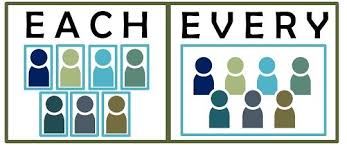But there's still some important things that you need to know.
但是大家还需要知道一些重要的事情。
So when you're talking about exactly two things, you can use 'each', not when you're talking about three or four or ten things.
当大家讨论具体的两个事物的时候,可以使用‘each’,但是三个、四个或者是十个东西就不行了。
Only when you're talking about two.
只有当你谈论的是两个事物的时候才可以。
I've got an earing in each ear.
我两个耳朵都有一只耳环。
I've got two ears, so I can use 'each' to talk about my ears but I can't use 'every', alright?
我有两只耳朵,所以我用‘each’来描述我的耳朵,但是不能使用‘every’对吗?
I have an earring in every ear.
我所有耳朵都有一只耳环。
It sounds really quite strange like, how many ears do you have?
听起来很奇怪啊,你到底有多少耳朵?
Earlier I told you that 'each' and 'every' are usually used with singular nouns but there is a little exception or a rule that we've got to talk about here.
之前我告诉过大家‘each’和‘every’通常都和单数名词连用,但是也有一个小例外,或者是小规则,我们这里要讲一下。
'Every' can't be used with plural nouns but 'each' can be used with plural nouns with a small change in form.
‘Every’不可以和复数名词连用,但是‘each’可以和复数名词连用,但形式需要改变一下。
To use 'each' with plural nouns, you need to add the word 'of'.
要将‘each’和复数名词连用的话,需要加上一个‘of’。
Each car has a red collar.
每只猫都有一只红项圈。
We can't say: each cats have a red collar.
我们不能说:每只猫都有一只红项圈。
But we can say: each of the cats has a red collar.
但是我们可以说:每只猫都有一只红项圈。
Now there's not much difference in meaning between these two correct sentences but it's important to notice that we do include the article 'the' here.
这两个正确的句子之前没有什么很大的区别,但是重要的是要注意我们在这里加上了冠词‘the’。

It's really important, right?
这非常重要,对吗?
You must use it unless you're using the plural determiners or pronouns like 'us' or 'them' or 'these' or 'those', we don't need to use the article then.
大家必须使用它,除非你是用的是复数限定词或者是像‘us’、‘them’、‘these’或者是‘those’这种代词,我们都不需要使用冠词。
Right so let's look at a couple of examples of how they're used.
好的,那让我们看一下应该如何使用的几个例子吧。
Each of us won a prize.
我们每个人都获奖了。
Each of the kids was given a balloon.
每个孩子都得到了一个气球。
Did Sarah make each of those?
每个都是萨拉做的吗?
It's really important there that we are using our finger to point at what we're talking about.
非常重要的一件事是我们在用指头指我们在说的东西。
Another useful thing to keep in mind is that 'every' is more commonly used with time expressions.
另外一件需要记住的很有用的事情就是‘every’在时间表达中更为常用。
She visits her grandma every Thursday.
她每周四都去看望祖母。
Rebecca is on social media so much, she checks her Facebook every hour!
瑞贝卡太沉迷社交网络了,她每个小时都要看她的脸书!
Now actually 'each' wouldn't be wrong in either of these sentences.
其实‘each’在这两个句子中都不是错的。
You could use 'each' with many of these time expressions but 'every' is just more common and it usually sounds a little more natural.
在很多时间表达中都可以使用‘each’,但是‘every’只是更常见一点,通常听起来也更加自然。
The difference is very subtle.
差别非常的细微。
Each Monday at 2 pm I have a meeting.
每周一的下午两点我都要开会。
That's fine.
很好。
Every Monday at 2 pm I have a meeting.
每周一的下午两点我都要开会。
It's a little better, it sounds a little more natural.
这个更好,听起来更加自然。
So right now it's time to see if you've been paying attention through this lesson because we're about to practise.
现在是时候去检验一下你这节课有没有认真听了,因为我们要进行练习了。
So I want you to see if you can complete each of the sentences that you see up here with the right word.
我想让大家检查一下是不是能够用正确的单词完成你在这里看到的每个句子。
You have to think about the subtle differences.
你要考虑细微的区别。
So let's assume that the emphasis is on the individual cup here.
让我们假设这里的重点是放在每个个体。
So 'each' would be correct because of the singular noun.
所以呢‘each’是对的,因为是单数名词。
What about this one?
那这个呢?
Yep, 'every' because Saturday morning is a time expression.
是的,用‘every’,因为周六早晨是一个时间表达。
What about this one? It has to be 'each', doesn't it?
那这个呢?肯定是‘each’,对吧?
Because there are exactly two wrists. Perfect.
因为有两个腕关节。很完美。
I guess that has to be 'every', right?
我猜这个应该是‘every’,对吧?
Because we're talking about the group as a whole.
因为我们谈论的是整个团体。
And so when we're talking about everyone as a group, you need to use 'every'.
所以当我们谈论的是所有的人作为一个团体的时候,需要使用‘every’。
Alright in this last example here, let's keep our attention on the house as a whole, okay?
好的,在最后一个例子,让我们关注这个房子整体,好吗?
Our emphasis and our attention is on the whole house not the individual rooms inside.
我们的重点和关注点是房子整体,而不是每个房间。
So 'every' would be perfect but of course, you could use 'each' if you were emphasising each of the individual rooms.
所以呢‘every’是完美的答案,但是当然了,你可以使用‘each’,如果你强调的是每个房间的话。
All right I do have one more final question for you.
好的,我还有最后一个问题。
Do you remember at the start of this video when I said that I'm here to answer each and every one of your English questions?
你记得在视频的开始我说我要来回答大家的每一个问题吗?
So in that sentence, which option is the best option?
所以在这个句子里,哪个选择是最好的呢?
It's a trick question because you could use either okay?
这可是个小花招,因为两个都可以用的。
But you can also use them together like this.
但是你也可以一起使用,就像这个一样。
The phrase 'each and every' is really common in spoken English and it puts all of the emphasis on the whole group but every single person in the group.
这个短语‘each and every’在英语口语中非常常见,它不仅关注整体,也关注整体中的每个人。
So it's like a combination, right?
所以就像是一个结合,对吗?
And it's a fixed expression that you'll see from time to time and you'll see both of these words together and that's perfectly acceptable
这是个固定表达,大家可以经常看到,大家可以看到这两个单词一起,是完全可以接受的,
especially when you are trying to emphasise each and every person in the group is important.
尤其是当你要强调群体中的每个人都非常重要的时候。
So before I say goodbye to each and every one of you, I want you to tell me in the comments
所以在和每一个人说再见之前,我希望大家在评论区告诉我,
if there are any other English words like 'each' and 'every' that confuse you a little, that you'd like me to explain more
是不是有类似于‘each’和‘every’这种单词令你困惑,你想让我解释一下,
because I'll be making more videos just like this one to help you understand some of the more subtle differences between English words
因为我正在做类似于这一个的视频来帮助大家理解英语单词中的更多细微的区别,
and help you to sound a little more natural as you're using English.
帮助你听起来在使用英语的时候更加自然。
Now make sure you subscribe to my channel by clicking that button right down there and then come and check out this lesson right here.
一定要订阅我的频道哦,点击下面的按钮就可以,然后就看一下这节课程吧。
I think you're going to love it.
我猜大家一定会喜欢的。
I'll see you in there!
再见啦!












